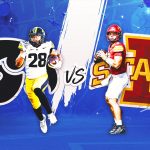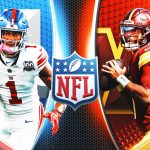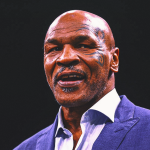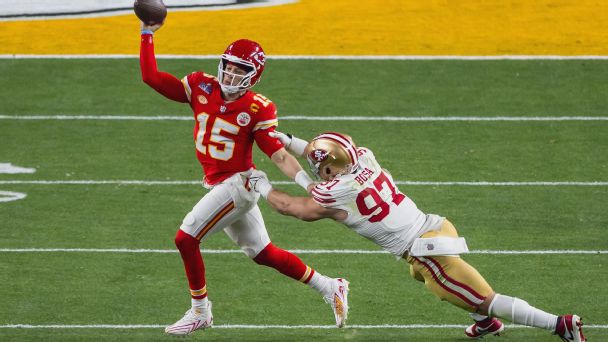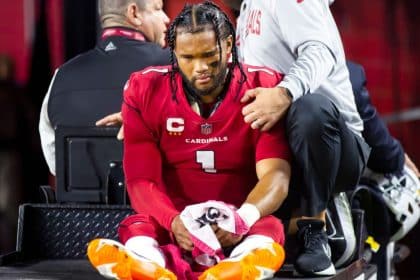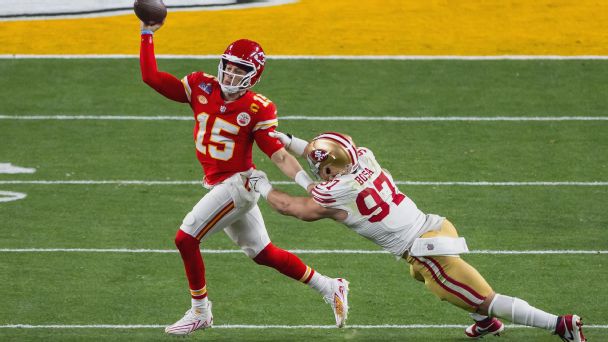
SANTA CLARA, Calif. — The San Francisco 49ers‘ loss in Super Bowl LVIII offered a sobering reminder to every NFL team: if you want to win the Lombardi Trophy, you’re probably going to have to go through the Kansas City Chiefs.
For the Chiefs, the 25-22 overtime victory earned them their third Super Bowl title in the past five seasons. With superstar quarterback Patrick Mahomes, coach Andy Reid and the core of a championship roster in place for the foreseeable future, the Chiefs have everything they need to build on their dynasty.
It’s why, less than 48 hours after coming up short, Niners fullback Kyle Juszczyk was already pondering what San Francisco might face if it can again scale the NFL mountain.
“When I envision us back in the Super Bowl, I do envision it probably against them because of what they have there,” Juszczyk said. “There’s a reason they’re so successful. Patrick Mahomes is going to go down as one of the best players in the NFL. They do it with a really good defense and they have incredible coaching, so that’s usually the type of teams you’re going to have to play in the Super Bowl.”
Defensive end Nick Bosa agreed with Juszczyk before expanding on it.
“I think everybody in the league probably thinks that,” Bosa said.
It rings especially true for the 49ers, who have played Kansas City in two Super Bowls in five seasons and lost both times. What’s more, the 49ers are 0-4 with three double-digit losses against the Chiefs since coach Kyle Shanahan took over in 2017, the most defeats without a win against any opponent for San Francisco under Shanahan.
In those four meetings, the Niners have been outscored by an average of 34.5 to 23 and outgained by an average of 441.3 to 395.8. Their lowest offensive yardage outputs have come in the two Super Bowls (351 in Super Bowl LIV and 382 in LVIII).
As the Niners embark on another important offseason in their quest to finally win their sixth Super Bowl title, they might have to take a closer look at how, specifically, they can fare better against the Chiefs.
For most teams, the approach to free agency and the draft comes with a throughline of how to overcome division opponents. The 49ers have proved plenty capable of that, winning the NFC West two consecutive seasons and three times since 2019 and advancing to the Super Bowl twice.
What they haven’t done is solved the red and white problem from western Missouri. It’s not due to a lack of effort.
After coughing up a 10-point lead to Kansas City in Super Bowl LIV to end the 2019 season, the 49ers spent the ensuing years looking for players who could prevent such a lead from evaporating.
“One of the things we added after ’19 was finishers,” general manager John Lynch said. “We need finishers in every area of our team. We’ve got a lot of those and it still wasn’t quite good enough. And so, you go back, we’ll continue to improve this team.”
With free agency set to start next week, with the legal tampering period beginning Monday before players can be officially signed when the league year opens on March 13, the 49ers again find themselves with plenty of business to handle. On the bright side, it’s the first offseason in years in which there are no questions about the starting quarterback. Brock Purdy is locked into that job.
The Niners don’t need a serious makeover but do need immediate help on the offensive and defensive lines and in the secondary, with longer-term needs at receiver and linebacker.
On paper, the offensive line appears to need the biggest upgrades. That unit has mostly held up through the Niners’ deep postseason runs but has repeatedly been exposed in the biggest moments. Whether it’s Chiefs defensive tackle Chris Jones, Los Angeles Rams defensive tackle Aaron Donald, Philadelphia Eagles edge rusher Haason Reddick or someone else, the 49ers have struggled to pass protect at key times.
In their latest Super Bowl loss, communication seemed to be the biggest issue. Through 18 games before that, the Niners had allowed an average of 7.6 pass plays per game in which there was an unblocked rusher going after Purdy.
Against the Chiefs, that number jumped to 15, including a key third down at Kansas City’s 9 in overtime which likely would have resulted in a touchdown had someone blocked Jones before he got to Purdy to force a hurried incompletion.
Many of those issues seemed to be concentrated on the right side, where tackle Colton McKivitz has one year left on his deal, guard Jon Feliciano is scheduled to be a free agent and backup guard Spencer Burford has struggled to find consistency.
It’s easy enough to say that the offensive line needs to be fixed. Actually doing it is far more difficult given the constant need for competent linemen around the league.
“You look at (every option) every single year and you try to become the best team possible with the situation that you’re in,” Shanahan said. “You don’t just say, ‘Hey, we’re upgrading here this year.’ You’ve got to make sure that’s available. And if it’s not, then you get stronger in a different area. There’s lots of ways you can win. You just have to keep trying to find that way.”
Then there’s the Mahomes problem. The 49ers have done well against Mahomes for large chunks of both Super Bowl meetings but those games remained close enough for him to work his magic at the end.
In those two Super Bowl meetings, the Niners allowed Mahomes and the Chiefs to average 4.13 points per drive in the fourth quarter and overtime, a leap from the 1.81 points per drive they’ve allowed to every other team in the fourth quarter and overtime in the postseason.
The simplest suggestion would be for the Niners to keep getting as many good players as possible, hoping that it’s eventually enough to conquer Mahomes and the Chiefs.
“You can have the most talented roster in the NFL, which I really do think we do and have incredible coaching, which I think we do,” Juszczyk said. “You can put yourself in the absolute best position and sometimes you get beat and all you can do is continue to try and put yourself in that best position, but you’re just never guaranteed anything.”

